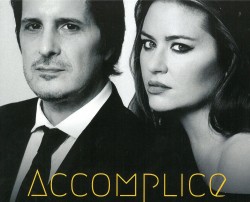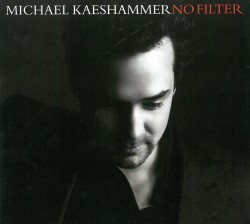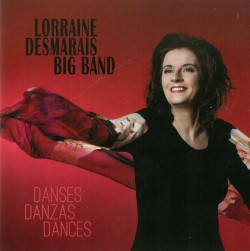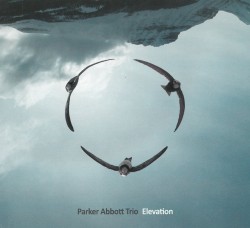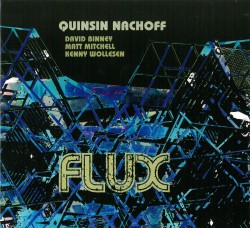Catching Up with Canadian Expats
Question: What’s the best way to become famous in Canada? Answer: Leave the country. Unfortunately that hoary jape still has currency in 2016, especially if you want to be a renowned actor. Music is less aggressive and plenty of first-class musicians make their home in the Dominion; some foreigners even relocate here. Still for many improvisers, concerns, both personal and professional, cause them to abandon their native land. Expatriation often means interaction with a wider crew of players than if they had stayed put and these recent discs capture the results of those challenges.
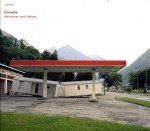 One change from years past is that instead of setting up shop in the US, determined musicians range further afield. Advances and Delays (SOFA A551 sofamusic.no) by the Circadia quartet, for instance, includes Vancouver-raised, Stockholm-based, bassist Joe Williamson along with Australian drummer Tony Buck, plus guitarists David Stackenäs from Sweden and Kim Myhr from Norway. More an impressionistic journey than a realized destination, the folksy trappings of Advances and Delays are like a lace comforter wrapped around a steel pole: tempered steel shores up what seems to be flimsy. Much of this buttressing can be attributed to Williamson’s chunky pulsations, particularly prominent on The Human Volunteers Were Kept in Isolation. Besides that, with 16 and sometimes 22 strings in use – Myhr also plays 12-string – the effect is somewhat like hearing a string quartet, country string band and gagaku ensemble trade licks. On The Animal Enters and Traverses the Light, reflections of guitar-centric ensembles exist, but unlike flamenco faceoffs or rock-band guitar challenges, there’s no audible timbre swaggering. While the string stokers knit themes out of multiple crossovers and tremolo intersections, Buck subtly rumbles parts of the kit with gong resonation, rim rubs and castanet-like clicks. Machine-like rotations result when the four meet critical mass and each track is resolved satisfactorily. And due to the intermediate length of the two performances, unlike other drone-ambient bands defeated by stasis, Circadia never wears out its welcome.
One change from years past is that instead of setting up shop in the US, determined musicians range further afield. Advances and Delays (SOFA A551 sofamusic.no) by the Circadia quartet, for instance, includes Vancouver-raised, Stockholm-based, bassist Joe Williamson along with Australian drummer Tony Buck, plus guitarists David Stackenäs from Sweden and Kim Myhr from Norway. More an impressionistic journey than a realized destination, the folksy trappings of Advances and Delays are like a lace comforter wrapped around a steel pole: tempered steel shores up what seems to be flimsy. Much of this buttressing can be attributed to Williamson’s chunky pulsations, particularly prominent on The Human Volunteers Were Kept in Isolation. Besides that, with 16 and sometimes 22 strings in use – Myhr also plays 12-string – the effect is somewhat like hearing a string quartet, country string band and gagaku ensemble trade licks. On The Animal Enters and Traverses the Light, reflections of guitar-centric ensembles exist, but unlike flamenco faceoffs or rock-band guitar challenges, there’s no audible timbre swaggering. While the string stokers knit themes out of multiple crossovers and tremolo intersections, Buck subtly rumbles parts of the kit with gong resonation, rim rubs and castanet-like clicks. Machine-like rotations result when the four meet critical mass and each track is resolved satisfactorily. And due to the intermediate length of the two performances, unlike other drone-ambient bands defeated by stasis, Circadia never wears out its welcome.
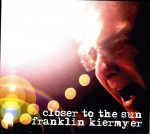 A more convoluted path is followed by Montreal drummer Franklin Kiermyer, who lives in Oslo, unless he’s gigging in New York or meditating in Asian retreats. Someone whose spiritual pursuits parallel those of jazz avatar John Coltrane, the drummer’s Closer to the Sun (Mobility Music MMII016 franklinkiermyer.com) proves that he could have been the perfect accompanist to the influential saxophonist if he hadn’t died before Kiermyer was ten. Nevertheless in its intensity and make-up this CD resembles a missing Trane session with personnel modelled on Coltrane’s classic quartet, featuring tenor saxophonist Lawrence Clark, pianist Davis Whitfield and bassist Otto Gardner. Not that Kiermyer is an imitator though. Like a painter whose canvases fall within the school of an established master but are distinct, so is the drummer’s work. All 13 tunes are originals, with Kiermyer’s polyrhythmic command the guiding force. Using every part of his kit the way a painter mixes particular colours to reflect varied visions, the drummer’s focused clatter is distinctive on calm ballads just as his intensity expressed in protracted cymbal and drum outbursts is perfect for staccato numbers. Emancipation Proclamation is a perfect instance of this as Whitfield’s buoyant chording adds to Clark’s ecstatic roar as the drummer breaks up the rhythm and then sews it back together again. The saxophonist fractures tones into atoms as if he’s a scientist examining them under a microscope as on Unified Space-Time. Later reconnecting the DNA of those shards into heightened sounds, Clark’s growling intensity is connected to the technique of Pharoah Sanders, who played with both Trane and Kiermyer. Heliocentric is characterized by a snapping, slapping guitar-like solo from Gardner; while Whitfield’s keyboard architecture extends from maintaining the theme with spreading glissandi pools to crashing through clotted polyphony with anvil-like jabs as on Mixed Blood. This date ends with the low key Humanity which, despite tempered cymbal splashes and upward reed slurs, sounds more like Ain’t No Sunshine than Ascension. It confirms that Kiermyer has extended his Trane ride so that his own music is the destination.
A more convoluted path is followed by Montreal drummer Franklin Kiermyer, who lives in Oslo, unless he’s gigging in New York or meditating in Asian retreats. Someone whose spiritual pursuits parallel those of jazz avatar John Coltrane, the drummer’s Closer to the Sun (Mobility Music MMII016 franklinkiermyer.com) proves that he could have been the perfect accompanist to the influential saxophonist if he hadn’t died before Kiermyer was ten. Nevertheless in its intensity and make-up this CD resembles a missing Trane session with personnel modelled on Coltrane’s classic quartet, featuring tenor saxophonist Lawrence Clark, pianist Davis Whitfield and bassist Otto Gardner. Not that Kiermyer is an imitator though. Like a painter whose canvases fall within the school of an established master but are distinct, so is the drummer’s work. All 13 tunes are originals, with Kiermyer’s polyrhythmic command the guiding force. Using every part of his kit the way a painter mixes particular colours to reflect varied visions, the drummer’s focused clatter is distinctive on calm ballads just as his intensity expressed in protracted cymbal and drum outbursts is perfect for staccato numbers. Emancipation Proclamation is a perfect instance of this as Whitfield’s buoyant chording adds to Clark’s ecstatic roar as the drummer breaks up the rhythm and then sews it back together again. The saxophonist fractures tones into atoms as if he’s a scientist examining them under a microscope as on Unified Space-Time. Later reconnecting the DNA of those shards into heightened sounds, Clark’s growling intensity is connected to the technique of Pharoah Sanders, who played with both Trane and Kiermyer. Heliocentric is characterized by a snapping, slapping guitar-like solo from Gardner; while Whitfield’s keyboard architecture extends from maintaining the theme with spreading glissandi pools to crashing through clotted polyphony with anvil-like jabs as on Mixed Blood. This date ends with the low key Humanity which, despite tempered cymbal splashes and upward reed slurs, sounds more like Ain’t No Sunshine than Ascension. It confirms that Kiermyer has extended his Trane ride so that his own music is the destination.
 A more common expatriate path is that of Burlington-born trumpeter Darren Johnston who now lives in California’s Bay area. On Shipwreck 4 (NoBusiness Records NBCD 67 nobusinessrecords.com), he’s united with three other local, but not native players – tenor saxophonist Aaron Bennett, bassist Lisa Mezzacappa and drummer Frank Rosaly – for a contemporary lesson in advanced improvisation. Like a poised high-wire act, the quartet’s talents are carefully balanced on the six tracks. Counted Like Flies for instance, mates a bluesy honk from Bennett with Johnston’s plunger snorts that colour the theme even as both players’ lines snake around one another. Meanwhile Rosaly’s snare bumps and Mezzacappa’s upward string sluices allow the trumpeter to whizz brass kisses from his mouthpiece by the finale. This adaptability is further highlighted on a track like Bloom whose final sequence involves the trumpeter playing hide-and-seek with himself with one chorus gently muted and one open horn. With the bassist spinning out a sympathetic ostinato underneath, the polyphonic piece evolves from an out-of-the-gate challenge from the saxophonist to a mellower response from Johnston plus a brisk mid-section devoted to the bassist scratching sul ponticello tones and the drummer clattering cymbals and rim shots. This sets up brass role-playing at the end. Bennett’s muscular but tempered tone plus Johnston’s slurry grace notes also allow the band to bring the proper dignity to the set’s ballads. Overall, any tension engendered by outside techniques such as tongue slaps, key percussion or freak notes is resolved with an application of sympathetic harmony.
A more common expatriate path is that of Burlington-born trumpeter Darren Johnston who now lives in California’s Bay area. On Shipwreck 4 (NoBusiness Records NBCD 67 nobusinessrecords.com), he’s united with three other local, but not native players – tenor saxophonist Aaron Bennett, bassist Lisa Mezzacappa and drummer Frank Rosaly – for a contemporary lesson in advanced improvisation. Like a poised high-wire act, the quartet’s talents are carefully balanced on the six tracks. Counted Like Flies for instance, mates a bluesy honk from Bennett with Johnston’s plunger snorts that colour the theme even as both players’ lines snake around one another. Meanwhile Rosaly’s snare bumps and Mezzacappa’s upward string sluices allow the trumpeter to whizz brass kisses from his mouthpiece by the finale. This adaptability is further highlighted on a track like Bloom whose final sequence involves the trumpeter playing hide-and-seek with himself with one chorus gently muted and one open horn. With the bassist spinning out a sympathetic ostinato underneath, the polyphonic piece evolves from an out-of-the-gate challenge from the saxophonist to a mellower response from Johnston plus a brisk mid-section devoted to the bassist scratching sul ponticello tones and the drummer clattering cymbals and rim shots. This sets up brass role-playing at the end. Bennett’s muscular but tempered tone plus Johnston’s slurry grace notes also allow the band to bring the proper dignity to the set’s ballads. Overall, any tension engendered by outside techniques such as tongue slaps, key percussion or freak notes is resolved with an application of sympathetic harmony.
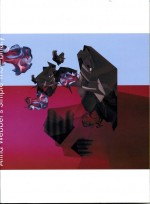 Vancouver Island-born tenor saxophonist/flutist Anna Webber now lives in Brooklyn and the hard wiring of her trio, filled out by New York pianist Matt Mitchell and Montreal-based drummer John Hollenbeck, riffs on Internet memes. Uniquely, the dozen selections composed by Webber for Binary (Skirl Records 033 skirlrecords.com) were inspired by YouTube, a random binary digit generator and her own IP address. Don’t fear weird sci-fi timbres, however. The Simple Trio has been together long enough to translate technical cyberspace into textural cadences. Disintegratiate, for instance, turns out to have a blues-based theme propelled by Webber’s yearning reed tones, broken apart into particles then reassembled via cymbal claps and keyboard pulsations. With repeated piano clusters creating a melancholy exposition, the title tune may be as dolorous and isolated as some binary coders, but the saxophonist’s subsequent slurs that appear to be stripping the reed to its core, coupled with a shuffle rhythm, can be heard as celebration when the coding creates instructions. Additionally this CD’s Meme passes its information via saucy piano lines that slowly get speedier until the tune finishes at a gallop. More conventionally, the contest of strength celebrated on Tug o’ War is between equine-like hoof beats produced by Hollenbeck and staccato, continuous flute pitches created in profusion by Webber. This (wo)man-(imaginary) beast match is resolved as Mitchell’s sober chording pushes the other two into tandem motion. Like a single integer in binary code, six brief tracks, labelled with Rectangles and a number designate one idea each, with the most notable, the concluding Rectangles 1a, which dramatically contrasts reed split tones and pauses. Underwhelmed ends up being the most ludicrously named tune since sweeping piano motions, jumping pops from Hollenbeck and Webber’s buoyantly coiled pitch variations combine into a cheerful romp.
Vancouver Island-born tenor saxophonist/flutist Anna Webber now lives in Brooklyn and the hard wiring of her trio, filled out by New York pianist Matt Mitchell and Montreal-based drummer John Hollenbeck, riffs on Internet memes. Uniquely, the dozen selections composed by Webber for Binary (Skirl Records 033 skirlrecords.com) were inspired by YouTube, a random binary digit generator and her own IP address. Don’t fear weird sci-fi timbres, however. The Simple Trio has been together long enough to translate technical cyberspace into textural cadences. Disintegratiate, for instance, turns out to have a blues-based theme propelled by Webber’s yearning reed tones, broken apart into particles then reassembled via cymbal claps and keyboard pulsations. With repeated piano clusters creating a melancholy exposition, the title tune may be as dolorous and isolated as some binary coders, but the saxophonist’s subsequent slurs that appear to be stripping the reed to its core, coupled with a shuffle rhythm, can be heard as celebration when the coding creates instructions. Additionally this CD’s Meme passes its information via saucy piano lines that slowly get speedier until the tune finishes at a gallop. More conventionally, the contest of strength celebrated on Tug o’ War is between equine-like hoof beats produced by Hollenbeck and staccato, continuous flute pitches created in profusion by Webber. This (wo)man-(imaginary) beast match is resolved as Mitchell’s sober chording pushes the other two into tandem motion. Like a single integer in binary code, six brief tracks, labelled with Rectangles and a number designate one idea each, with the most notable, the concluding Rectangles 1a, which dramatically contrasts reed split tones and pauses. Underwhelmed ends up being the most ludicrously named tune since sweeping piano motions, jumping pops from Hollenbeck and Webber’s buoyantly coiled pitch variations combine into a cheerful romp.
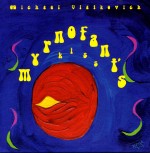 Sometimes the Canadian expatriate anecdote gets tuned on its head when artists from other countries establish themselves here. One example is American David Mott, a long-time York University professor whose bravura baritone saxophone command is featured on many records. California trombonist Michael Vlatkovich’s Myrnofant’s Kiss (pfMENTUM CD 095 pfmentum.com) is one. Not only was the disc recorded and produced in Toronto, but Jonathan Golove, who plays electric cello on the date, teaches at the University at Buffalo. Another Californian, Christopher Garcia, is the drummer. Working through eight of Vlatkovich’s quirkily titled compositions, emphasis is placed on the contrapuntal interaction of the low pitches from trombone and saxophone with the overlapping suggesting a rhino and an elephant trumpeting as they leapfrog. These timbres are displayed on tracks such as Hold on to Your Chair Watch Out for Snakes where Vlatkovich’s spluttering spectral glides and Mott’s bagpipe-like tremolo bellows provide a unison pitch shattering of the ambulatory theme. Here, as in many other instances, Golove’s spiccato roughens the narrative as he contributes to the march time propelled by Garcia. Vlatkovich’s slide command is such that he can express Dixieland-styled gutbucket slurs to challenge Mott’s tongue splaying and Golove’s string winnowing on Stop Scaring the Toddlers and Farm Animals as comfortably as he extends the range of his instrument into vocalized multiphonics alongside the saxophonist’s agitated whines that eventually slow down the piece. Pitchsliding their way through tunes that wed pseudo-waltz time to pseudo-martial music to piledriver themes as frantic as any bop line, the quartet members come up with music that’s both sinewy and hummable. With melodies recapped for familiarity even as they indulge in instrumental bravura, tracks are experimental without being off-putting. Vlatkovich’s and the others’ philosophy can be summed up in his penultimate song title: Leave the Worrying to the Professionals. This musical professionalism thrives among Canadian improvisers, although many have to leave home to get a proper hearing.
Sometimes the Canadian expatriate anecdote gets tuned on its head when artists from other countries establish themselves here. One example is American David Mott, a long-time York University professor whose bravura baritone saxophone command is featured on many records. California trombonist Michael Vlatkovich’s Myrnofant’s Kiss (pfMENTUM CD 095 pfmentum.com) is one. Not only was the disc recorded and produced in Toronto, but Jonathan Golove, who plays electric cello on the date, teaches at the University at Buffalo. Another Californian, Christopher Garcia, is the drummer. Working through eight of Vlatkovich’s quirkily titled compositions, emphasis is placed on the contrapuntal interaction of the low pitches from trombone and saxophone with the overlapping suggesting a rhino and an elephant trumpeting as they leapfrog. These timbres are displayed on tracks such as Hold on to Your Chair Watch Out for Snakes where Vlatkovich’s spluttering spectral glides and Mott’s bagpipe-like tremolo bellows provide a unison pitch shattering of the ambulatory theme. Here, as in many other instances, Golove’s spiccato roughens the narrative as he contributes to the march time propelled by Garcia. Vlatkovich’s slide command is such that he can express Dixieland-styled gutbucket slurs to challenge Mott’s tongue splaying and Golove’s string winnowing on Stop Scaring the Toddlers and Farm Animals as comfortably as he extends the range of his instrument into vocalized multiphonics alongside the saxophonist’s agitated whines that eventually slow down the piece. Pitchsliding their way through tunes that wed pseudo-waltz time to pseudo-martial music to piledriver themes as frantic as any bop line, the quartet members come up with music that’s both sinewy and hummable. With melodies recapped for familiarity even as they indulge in instrumental bravura, tracks are experimental without being off-putting. Vlatkovich’s and the others’ philosophy can be summed up in his penultimate song title: Leave the Worrying to the Professionals. This musical professionalism thrives among Canadian improvisers, although many have to leave home to get a proper hearing.
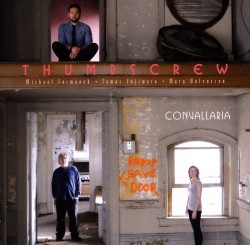 Convallaria
Convallaria






